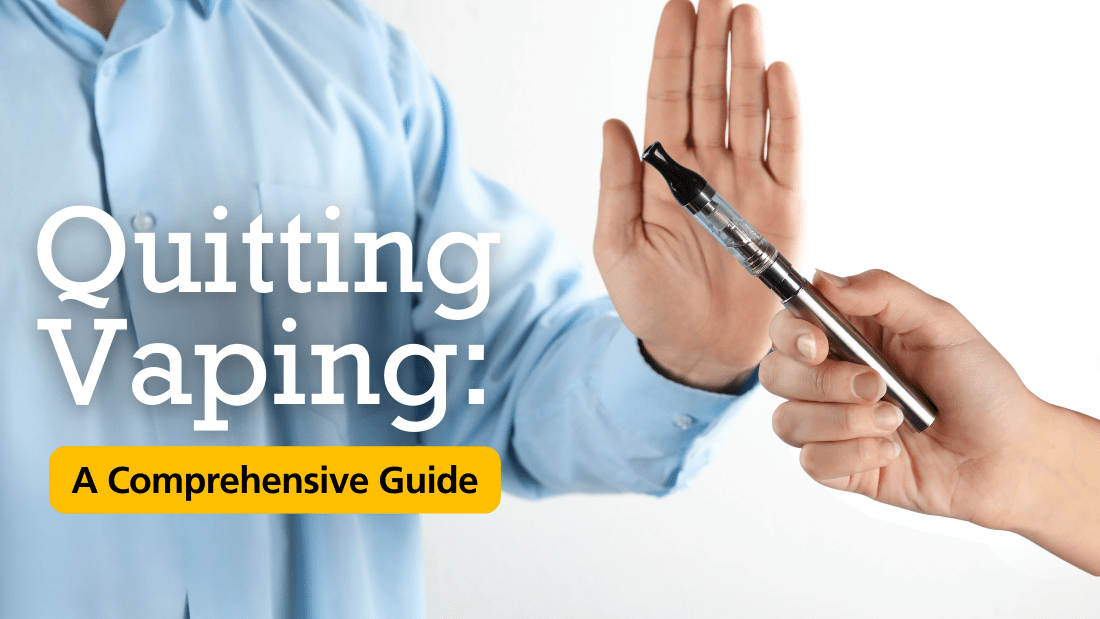
Quitting Vaping: A Comprehensive Guide
Quitting Vaping: A Comprehensive Guide
Vaping has become increasingly popular in recent years, but its long-term effects are still being studied. Many people are now choosing to quit vaping, for reasons ranging from health concerns to the desire to break a habit. Quitting vaping can be challenging, but it's definitely possible. This comprehensive guide will provide you with the information and strategies you need to succeed.
Understanding the Challenges of Quitting Vaping
Quitting vaping can be difficult for a few reasons:
- Nicotine Addiction: E-cigarettes contain nicotine, which is a highly addictive substance. This addiction can lead to cravings, withdrawal symptoms, and difficulty quitting.
- Habitual Behavior: Vaping can become a habitual behavior, often associated with certain activities or times of day. Breaking this habit can be challenging.
- Psychological Dependence: Vaping can also lead to psychological dependence. Some people vape to cope with stress, anxiety, or boredom. Breaking this psychological dependence can be a significant challenge.
Steps to Quit Vaping
Here is a step-by-step guide to help you quit vaping:
1. Set a Quit Date
Choose a date to quit and make it public. Sharing your plans with friends and family can provide you with support and accountability.
2. Understand Your Triggers
Identify the situations or activities that trigger your urge to vape. This could be anything from socializing with friends who vape to feeling stressed or bored. Once you know your triggers, you can start to avoid them or develop strategies for dealing with them.
3. Seek Support
Quitting vaping is easier with support. Talk to your doctor, a therapist, or a support group. You can also join online communities or forums for people who are quitting vaping.
4. Nicotine Replacement Therapy (NRT)
NRT products can help reduce nicotine cravings and withdrawal symptoms. There are many different types of NRT available, including patches, gum, lozenges, and inhalers. Your doctor can help you choose the right NRT product for you.
5. Behavioral Therapy
Behavioral therapy can help you develop strategies for coping with cravings and managing stress. A therapist can teach you techniques like relaxation exercises, deep breathing, and mindfulness.
6. Develop Healthy Habits
Replace vaping with healthy habits. This could include:
- Exercise: Physical activity can help reduce stress and cravings.
- Healthy Eating: Make sure you're eating a nutritious diet.
- Hydration: Drink plenty of water throughout the day.
- Hobbies: Engage in activities you enjoy.
7. Be Patient and Persistent
Quitting vaping is a process. You may experience setbacks along the way, but it's important to be patient and persistent. Keep trying and don't give up.
Managing Withdrawal Symptoms
Withdrawal symptoms are common when quitting vaping. They can include:
- Cravings
- Irritability
- Difficulty concentrating
- Sleep problems
- Headaches
- Increased appetite
These symptoms are usually temporary and will gradually subside. However, they can be challenging to manage. Here are some tips for dealing with withdrawal symptoms:
- Distract yourself: Engage in activities that you enjoy.
- Practice relaxation techniques: Deep breathing, meditation, or yoga can help reduce stress and cravings.
- Avoid triggers: Stay away from places or situations that make you want to vape.
Preventing Relapse
Relapse is common when quitting vaping, but it doesn't mean you've failed. Here are some tips for preventing relapse:
- Be prepared: Identify your triggers and develop strategies for dealing with them.
- Seek support: Talk to a friend, family member, or therapist about your struggles.
- Don't give up: If you relapse, don't beat yourself up. Get back on track as soon as possible.
Long-Term Benefits of Quitting Vaping
Quitting vaping has numerous long-term benefits for your physical and mental health:
- Improved Respiratory Health: Your lungs will begin to heal, improving your breathing and reducing your risk of respiratory illnesses.
- Reduced Cardiovascular Risk: Quitting vaping can lower your risk of heart disease, stroke, and other cardiovascular problems.
- Improved Dental Health: Vaping can damage your teeth and gums. Quitting can help prevent these problems.
- Increased Energy Levels: You'll likely experience an increase in energy levels as your body recovers from nicotine addiction.
- Enhanced Sense of Taste and Smell: Vaping can dull your sense of taste and smell. Quitting will help restore these senses.
- Improved Mental Health: Quitting vaping can reduce stress, anxiety, and depression.
Conclusion
Quitting vaping is a challenge, but it's a worthwhile goal. With the right support, strategies, and determination, you can succeed. Remember to be patient with yourself and celebrate your progress along the way. Quitting vaping can lead to a healthier, happier, and more fulfilling life.









